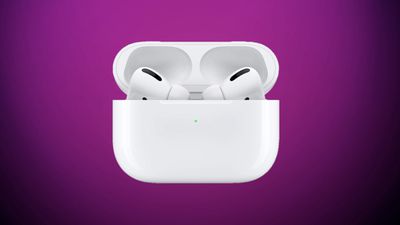AirPods Users Without a Nearby Apple Device Can Visit an Apple Store to Update Firmware
Apple's AirPods, AirPods Pro, and AirPods Max headphones regularly receive over-the-air firmware updates that are installed through an iPhone, iPad, or Mac, but for those who do not have an Apple device, there is no way to get new firmware on their own.

In an updated AirPods firmware support document, Apple today addressed this situation, recommending those without an Apple device visit an Apple Store or an Apple Authorized Service Provider to update their firmware. From the support document:
If you don't have an Apple device nearby, you can set up an appointment at an Apple Store or with an Apple Authorized Service Provider to update your firmware.
Visiting a retail location just for firmware is inconvenient, but it stands to reason that most people who own AirPods have an Apple device of some kind. Android users and PC users will not be able to install firmware updates from their devices because Apple does not make any kind of AirPods management app for those platforms. Apple does have a Beats app for Android devices that allows firmware to be updated.
Apple also updated the document to clarify that firmware updates are installed automatically when the AirPods are charging and are within range of an iPhone, iPad, or Mac that is connected to WiFi.
New AirPods firmware was released today, with firmware 5E133 bringing bug fixes and other improvements to the AirPods 2, AirPods 3, AirPods Pro, AirPods Pro 2, and AirPods Max.
Popular Stories
Apple will launch its new iPhone 17 series in two months, and the iPhone 17 Pro models are expected to get a new design for the rear casing and the camera area. But more significant changes to the lineup are not expected until next year, when the iPhone 18 models arrive.
If you're thinking of trading in your iPhone for this year's latest, consider the following features rumored to be coming...
In select U.S. states, residents can add their driver's license or state ID to the Wallet app on the iPhone and Apple Watch, providing a convenient and contactless way to display proof of identity or age at select airports and businesses, and in select apps.
Unfortunately, this feature continues to roll out very slowly since it was announced in 2021, with only nine U.S. states, Puerto Rico,...
Apple does not plan to refresh any Macs with updated M5 chips in 2025, according to Bloomberg's Mark Gurman. Updated MacBook Air and MacBook Pro models are now planned for the first half of 2026.
Gurman previously said that Apple would debut the M5 MacBook Pro models in late 2025, but his newest report suggests that Apple is "considering" pushing them back to 2026. Apple is now said to be...
Three out of four iPhone 17 models will feature more RAM than the equivalent iPhone 16 models, according to a new leak that aligns with previous rumors.
The all-new iPhone 17 Air, the iPhone 17 Pro, and the iPhone 17 Pro Max will each be equipped with 12GB of RAM, according to Fixed Focus Digital, an account with more than two million followers on Chinese social media platform Weibo. The...
A new Apple TV is expected to be released later this year, and a handful of new features and changes have been rumored for the device.
Below, we recap what to expect from the next Apple TV, according to rumors.
Rumors
Faster Wi-Fi Support
The next Apple TV will be equipped with Apple's own combined Wi-Fi and Bluetooth chip, according to Bloomberg's Mark Gurman. He said the chip supports ...
Since the iPhone X in 2017, all of Apple's highest-end iPhone models have featured either stainless steel or titanium frames, but it has now been rumored that this design decision will be coming to an end with the iPhone 17 Pro models later this year.
In a post on Chinese social media platform Weibo today, the account Instant Digital said that the iPhone 17 Pro models will have an aluminum...
Production of foldable OLED displays for Apple's first foldable iPhone have begun ahead of its expected launch next year, Korea's ETNews reports.
The first foldable iPhone's displays are being produced by Samsung Display, who are establishing a production line dedicated to the upcoming Apple device its A3 factory in Asan, Chungcheongnam-do. The production line will make displays exclusively...
iPhone 17 Pro and iPhone 17 Pro Max models with displays made by BOE will be sold exclusively in China, according to a new report.
Last week, it emerged that Chinese display manufacturer BOE was aggressively ramping up its OLED production capacity for future iPhone models as part of a plan to recapture a major role in Apple's supply chain.
Now, tech news aggregator Jukan Choi reports...



















